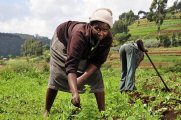EU-Africa trade partnership negotiations stalled
All the versions of this article: [English] [français]

Euractiv | 12 December 2013
EU-Africa trade partnership negotiations stalled
The upcoming deadline imposed by the European Commission to revise the EU’s preferential trade agreements with former colonies in the Africa, Caribbean and Pacific (ACP) region is raising concern among African countries.
The European Commission’s deadline to normalise trade relations with the ACP group of countries is getting closer. From 1 October 2014, ACPs will have to switch to new interim economic partnership agreements with the EU.
The current Economic Partnership Agreement (EPA) exempts beneficiary countries from customs duties and quotas, boosting the competitiveness of their products on the EU market.
If ACP countries do not sign up to the new interim economic partnerships by the October deadline, they will fall back into a less advantageous trade regime and lose the commercial preferences foreseen by the so-called Cotonou Agreement.
But as the deadline approaches, negotiators are still not close to renewing the agreement, over which they have stalled for years.
A summit dedicated to peace and security in Africa was held on 6 and 7 December in Paris, gathering around 40 African leaders. But the summit’s final conclusions only dedicated a short paragraph to the issue, saying that France was “in favour of concluding the regional [Economic Partnership Agreement] negotiations process with more favourable calendar and content conditions for African countries”.
Meanwhile, the clock is ticking. The next EU-Africa summit, scheduled for April 2014 in Brussels, looks already decisive.
“If there’s no agreement by then, it will become very complicated,” admitted an advisor to the French Development Minister, Pascal Canfin. “We need to renegotiate those economic partnership agreements quickly, otherwise custom duty will increase”, he warned.
Until now, seventeen ACP countries have failed to ratify or implement the agreements, concluded with the EU in 2007.
Lack of incentives
Some may not need to worry so much.
So-called Least Developed Countries (LDCs) - among which many African states - indeed enjoy complete access to the European market without reciprocity for all of their products, except arms, and will be able to maintain those favourable conditions in the interim economic partnership agreements.
However, this will not be the case for the relatively wealthier ACP countries. For them, the agreements mean they will need to open up their domestic markets to the EU because the favourable trade regime was deemed incompatible with the WTO’s international trade rules.
“According to the way Brussels interpreted the WTO’s rules, the trade agreement has to be liberalised for up to 80% and within a reasonable timeframe, that is 15 years,” said Laurent Levard from GRET, a French development NGO.
In other words, the EU offers to open up 100% of its market to African countries, which is almost already the case. For their part, African countries are asked to gradually open up their markets, up to 80% to European imports, 15 years after the ratification of the agreements.
“The imposition of the existing interim EPA model means forcing ACP countries to accept the opening of markets to European multinationals instead of the promised partnership,” the NGO warned in a letter sent to French President François Hollande after the African Summit in Paris.
Regional integration stalled
If so many African countries are dragging their feet, it is because they fear heavy financial losses after custom duties are abolished. They also worry about the influx of European products, which will become more competitive on the African market because of customs exemptions. “Africa remains poor and has a hard time transforming raw materials,” Levard said.
Negotiations are also hampered by the lack of regional integration in Africa, which was meant to be boosted by the agreements.
“However, in the current situation, the opposite is happening; each country is negotiating different agreements under an ultimatum,” noted two French senators, Jeanny Lorgeoux and Jean-Marie Bockel, in an information report published in October.
“These interim agreements are supposed to disappear once a regional agreement is signed," Laurent Levard reminded.
But for now, the negotiations are led on a country-by-country basis, leading to differences in substance which are making the establishment of regional free trade zones in Africa more difficult.
NEXT STEPS:
April 2014 : EU-Africa Summit in Brussels
1 October 2014 : Deadline to ratify economic partnership agreements
Cécile Barbière, EurActiv.fr





